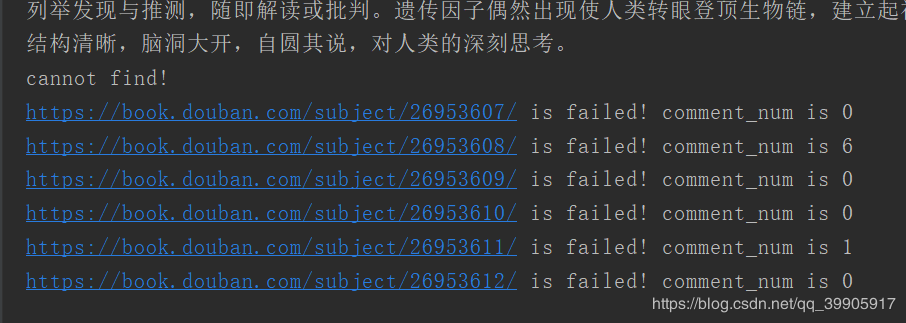爬取豆瓣读书的图书信息和评论信息
最近在做毕业设计,需要收集用户的评分数据做协同过滤算法,同时收集评论数据做情感分析
注意一个比较坑的地方就是豆瓣图书可以没有评分,或者用户评论了但没给评分。而且豆瓣图书的编码方式很无奈呀,热门书籍附近总是冷门书籍,无评分、无评论那种,所以经常输出failed fake_useragent的用法在这次爬虫中使用了fake_useragent来伪造请求头,因为听说豆瓣的反爬机制比较好
fake_useragent的用法简单如下,random是随机产生一个请求头
from fake_useragent import UserAgent
import requests
ua=UserAgent()
url="https://www.baidu.com" #请求的网址
headers={"User-Agent":ua.random} #请求头
response=requests.get(url=url,headers=headers) #请求网址
print(headers)
print(response.status_code) #响应状态信息
text = response.headers
for line in text.items():
print(line)
爬取豆瓣读书的图书信息和评论信息
首先需要观察的是这些的链接
https://book.douban.com/subject/26953606/ 图书信息页面
https://book.douban.com/subject/26953606/comments/ 第一页评论页面
https://book.douban.com/subject/26953606/comments/hot?p=2 第二页评论页面
可以看到前面都是相同的https://book.douban.com/subject/再加一个图书id,评论页面后面接一个/comments/,第二页评论后面接一个hot?p=2,由此递推低3页是hot?p=3
其中一些写入文本的操作省略了或者注释掉了,成了输出操作,因为大部分人玩爬虫不会去搞机器学习或者深度学习
第二天又修改了一下,热门图书的分布实在是太稀疏了,所以在程序里先判断评论总数是否超过一千,如果超过一千条就继续爬取,否则continue
#coding=utf-8
#下载豆瓣图书的评分、评论,需要建立四张表
#表一:图书ID,图书名,平均分
#表二:用户ID,用户名
#表三:图书ID,热门评论
#表四:图书ID,用户ID,评分,评分时间
import requests
import time
import random
from bs4 import BeautifulSoup
from fake_useragent import UserAgent
ua = UserAgent()
header = {
'User-Agent': ua.random
}
def get_score(book_id,text): #获取(图书ID,图书名,图书评分)
soup = BeautifulSoup(text,'lxml')
try:
book_name = soup.select("#wrapper > h1 > span") #返回书名的列表
name = book_name[0].string
book_score = soup.select("#interest_sectl > div > div.rating_self.clearfix > strong") #返回分数的列表
score = book_score[0].string
print("book name is " + str(name)+" and score is "+str(score)) #打印书名和分数
line = str(book_id) + "," + str(name) + "," + str(score) + "\n"
#with open("BookInfo.txt","w",encoding="utf-8") as file:
# file.write(line)
#file.close()
except:
print("book " + str(book_id) + " is failed!")
def get_user_score(score_str): #根据解析出字符串对应的分数
if score_str == "力荐": #5星
return 10
elif score_str == "推荐": #4星
return 8
elif score_str == "还行": #3星
return 6
elif score_str == "较差": #2星
return 4
else: #1星
return 2
def write_txt(soup,book_id): #参与为url,图书id,和网页页码
try: #为了防止报错,因为有些人可以不打分,那么在user_info下只有一个span
comment_list = soup.find_all("span","short") #找到评论所在的区域
for line in comment_list:
print(line.string) #打印评论
user_list = soup.find_all("span", "comment-info") #找到用户和评分的所在区域
for user_info in user_list:
user_name = user_info.find("a").string #用户姓名所在的
user_url = user_info.find("a").attrs["href"] #提取出超链接
user_id = user_url.split("/")[-2] #提取出用户id
score_info = user_info.find_all("span")[0].attrs["title"] #找到用户评分的区域
score = get_user_score(score_info) #提取出分数的文本
time_info = user_info.find_all("span")[1].string #提取出评分的时间
print("book_id is " + book_id +" user name is " + user_name + ",id is " + user_id + ",score is " + score_info + " " + time_info) #打印出一系列信息
'''BookComments = open("BookComments.txt", "w", encoding="utf-8")
BookComments.close()'''
except:
print("cannot find!")
def get_comments(soup, comment_url, book_id, page): #获取(图书ID,图书评论),(图书ID,用户ID,用户评分),(用户ID,用户名)
while page <= 2: #爬取的页数
if int(page) == 1: #如果是第一页
write_txt(soup, book_id) #传入超链接
page += 1 #页数加一
else:
comment_url += "hot?p=" + str(page) #拼合链接
html = requests.get(url=comment_url,headers=header)
if html.status_code == 200:
comment_text = html.text
soup = BeautifulSoup(comment_text,"lxml")
write_txt(soup, book_id) #传入超链接
page += 1 #页数加一
#https://book.douban.com/subject/26953606/
if __name__ == '__main__':
url="https://book.douban.com/subject/"
startID=26953605 #起始的图书ID
st = 0 #循环的起点
lens=3 #len=30000时,需要爬取的总书籍数
while st = 1000:
st +=1
print(str(startID)+" is success!" + score_url + " comment_num is " + comment_num)
text = html.text
get_score(startID,text)
time.sleep(random.uniform(1,3)) #暂停几秒,随机数在3-6s之间
get_comments(soup,comment_url,startID,1) #获取评论信息
time.sleep(random.uniform(1,3)) #暂停几秒,随机数在3-6s之间
else:
print(score_url + " is failed!" + " comment_num is " + comment_num)
else:
print(str(startID)+" is failed!")
输出如下

中间一堆数据省略了
这是爬取到了一些冷门书籍,评论数少得可怜,所以直接忽略了

作者:江西师范大学-16-吴悠